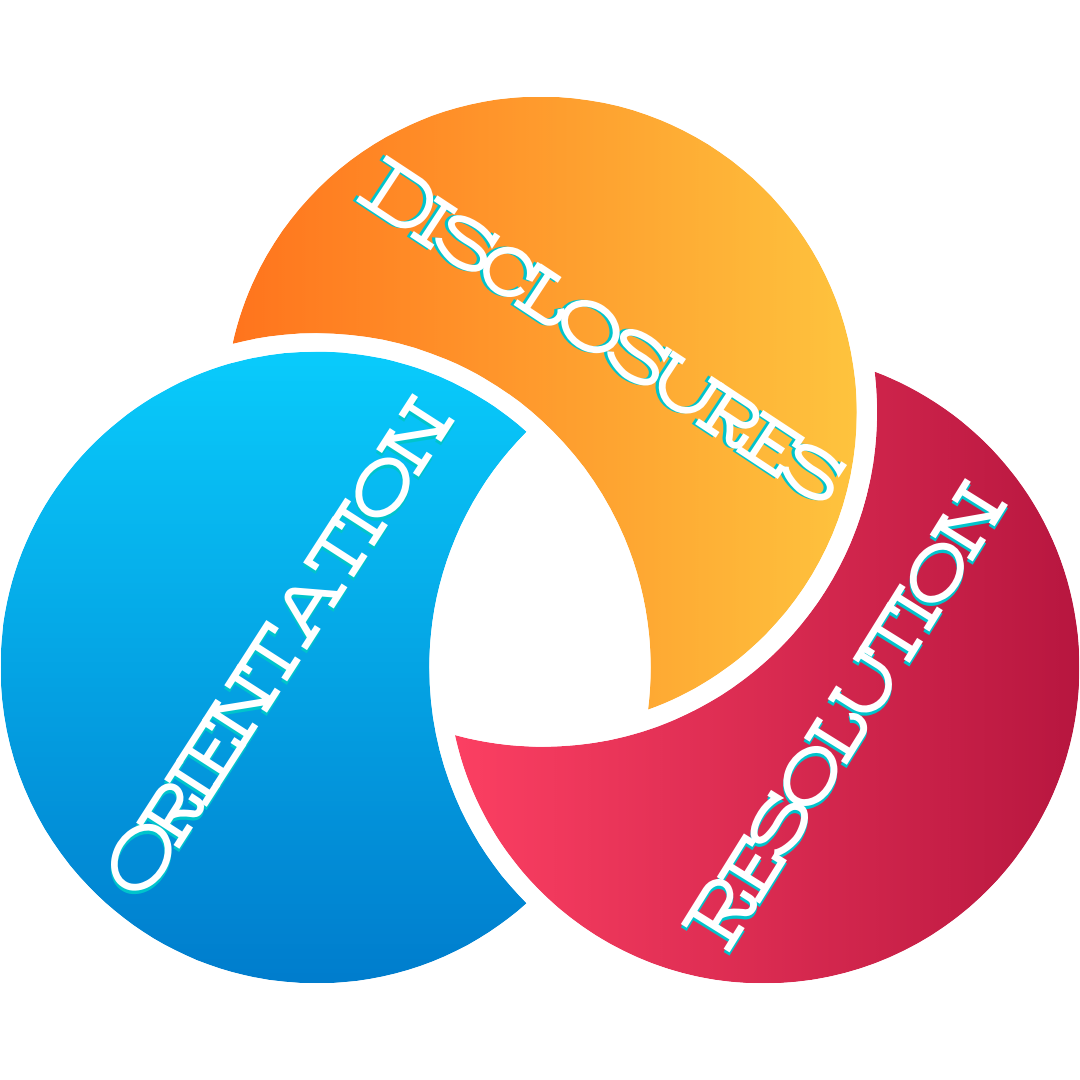Learn the Top 16 Divorce Mediation Confidentiality Laws in California
Here are rules about confidentiality in divorce mediations
There are many laws in California and even Federal Law that govern confidentiality of mediation. What we listed below are most of California's laws.
Evidence Code section 703.5
"No person presiding at any judicial or quasi-judicial proceeding, and no arbitrator or mediator, shall be competent to testify, in any subsequent civil proceeding, as to any statement, conduct, decision, or ruling, occurring at or in conjunction with the prior proceeding, except as to a statement or conduct that could (a) give rise to civil or criminal contempt, (b) constitute a crime, (c) be the subject of investigation by the State Bar or Commission on Judicial Performance, or (d) give rise to disqualification proceedings under paragraph (1) or (6) of subdivision (a) of Section 170.1 of the Code of Civil Procedure. However, this section does not apply to a mediator with regard to any mediation under Chapter 11 (commencing with Section 3160) of Part 2 of Division 8 of the Family Code."
Evidence Code section 703.5 states that you cannot make a mediator testify in a case about what happened in mediation, except in those situations listed in the code as exceptions.
You may wonder what the reference to "Chapter 11 (commencing with Section 3160) of Part 2 of Division 8 of the Family Code" means and why that is excluded. That refers to court ordered mediation for a child custody case. We cover that topic in an article on court required child custody mediation.
Evidence Code section 1115
"For purposes of this chapter:
(a) "Mediation" means a process in which a neutral person or persons facilitate communication between the disputants to assist them in reaching a mutually acceptable agreement.
(b) "Mediator" means a neutral person who conducts a mediation. "Mediator" includes any person designated by a mediator either to assist in the mediation or to communicate with the participants in preparation for a mediation.
(c) "Mediation consultation" means a communication between a person and a mediator for the purpose of initiating, considering, or reconvening a mediation or retaining the mediator."
This section just defines what the words mediation, mediator and mediation consultation mean.
Evidence Code section 1116
"(a) Nothing in this chapter expands or limits a court's authority to order participation in a dispute resolution proceeding. Nothing in this chapter authorizes or affects the enforceability of a contract clause in which parties agree to the use of mediation.
(b) Nothing in this chapter makes admissible evidence that is inadmissible under Section 1152 or any other statute."
Sometimes, our California legislature writes laws to make clear they do not intend to affect other laws. That is what this Evidence Code section essentially states. It is self-explanatory.
Evidence Code section 1117
"(a) Except as provided in subdivision (b), this chapter applies to a mediation as defined in Section 1115.
(b) This chapter does not apply to either of the following:
(1) A proceeding under Part 1 (commencing with Section 1800) of Division 5 of the Family Code or Chapter 11 (commencing with Section 3160) of Part 2 of Division 8 of the Family Code.
(2) A settlement conference pursuant to Rule 3.1380 of the California Rules of Court.
Once again, these rules do not apply to certain types of court ordered mediation like those that are part of "Family Conciliation Courts" (starting with Family Code section 1800) and court ordered child custody mediation (starting with Family Code 1800).
The reference to California Rules of Court 3.1380 is another exception and that refers to mandatory settlement conferences, which is a conference a court may order in a pending case.
Evidence Code section 1118
"An oral agreement "in accordance with Section 1118" means an oral agreement that satisfies all of the following conditions:
(a) The oral agreement is recorded by a court reporter or reliable means of audio recording.
(b) The terms of the oral agreement are recited on the record in the presence of the parties and the mediator, and the parties express on the record that they agree to the terms recited.
(c) The parties to the oral agreement expressly state on the record that the agreement is enforceable or binding, or words to that effect.
(d) The recording is reduced to writing and the writing is signed by the parties within 72 hours after it is recorded."
This code section defines what an oral agreement means.
Evidence Code section 1119
"Except as otherwise provided in this chapter:
(a) No evidence of anything said or any admission made for the purpose of, in the course of, or pursuant to, a mediation or a mediation consultation is admissible or subject to discovery, and disclosure of the evidence shall not be compelled, in any arbitration, administrative adjudication, civil action, or other noncriminal proceeding in which, pursuant to law, testimony can be compelled to be given.
(b) No writing, as defined in Section 250, that is prepared for the purpose of, in the course of, or pursuant to, a mediation or a mediation consultation, is admissible or subject to discovery, and disclosure of the writing shall not be compelled, in any arbitration, administrative adjudication, civil action, or other noncriminal proceeding in which, pursuant to law, testimony can be compelled to be given.
(c) All communications, negotiations, or settlement discussions by and between participants in the course of a mediation or a mediation consultation shall remain confidential."
This is the main mediation confidentiality code section. You can see it is written broadly to protect the confidentiality of communications in mediation.
You may wonder why this is so important? It is because California wants parties who attend mediation to know the compromises they offer and the discussions they have will ot be used against them. However, there are exceptions as you have seen, and you will see more below.
Evidence Code section 1120
"(a) Evidence otherwise admissible or subject to discovery outside of a mediation or a mediation consultation shall not be or become inadmissible or protected from disclosure solely by reason of its introduction or use in a mediation or a mediation consultation.
(b) This chapter does not limit any of the following:
(1) The admissibility of an agreement to mediate a dispute.
(2) The effect of an agreement not to take a default or an agreement to extend the time within which to act or refrain from acting in a pending civil action.
(3) Disclosure of the mere fact that a mediator has served, is serving, will serve, or was contacted about serving as a mediator in a dispute.
(4) The admissibility of declarations of disclosure required by Sections 2104 and 2105 of the Family Code, even if prepared for the purpose of, in the course of, or pursuant to, a mediation or a mediation consultation."
These are some of the exceptions to confidentiality.
In a divorce mediation, this is especially important.
For example, the written settlement agreement by the parties may, under some circumstances, be admissible in a subsequent proceeding.
In addition, documents one or both spouses give to the mediator which are otherwise discoverable or are subject to the fiduciary duty of the spouses, are not confidential just because they were given to the mediator during mediation. Some examples are declarations of disclosure, income and expense declarations, schedule of asset and debt and the attachments to these documents.
Evidence Code section 1121
"Neither a mediator nor anyone else may submit to a court or other adjudicative body, and a court or other adjudicative body may not consider, any report, assessment, evaluation, recommendation, or finding of any kind by the mediator concerning a mediation conducted by the mediator, other than a report that is mandated by court rule or other law and that states only whether an agreement was reached, unless all parties to the mediation expressly agree otherwise in writing, or orally in accordance with Section 1118."
Mediators are not judges. Unless the court ordered otherwise, mediators do not submit to a court their recommendations. There are exceptions to this which this code section lists.
Evidence Code section 1122
"(a) A communication or a writing, as defined in Section 250, that is made or prepared for the purpose of, or in the course of, or pursuant to, a mediation or a mediation consultation, is not made inadmissible, or protected from disclosure, by provisions of this chapter if any of the following conditions are satisfied:
(1) All persons who conduct or otherwise participate in the mediation expressly agree in writing, or orally in accordance with Section 1118, to disclosure of the communication, document, or writing.
(2) The communication, document, or writing was prepared by or on behalf of fewer than all the mediation participants, those participants expressly agree in writing, or orally in accordance with Section 1118, to its disclosure, and the communication, document, or writing does not disclose anything said or done or any admission made in the course of the mediation.
(3) The communication, document, or writing is related to an attorney's compliance with the requirements described in Section 1129 and does not disclose anything said or done or any admission made in the course of the mediation, in which case the communication, document, or writing may be used in an attorney disciplinary proceeding to determine whether the attorney has complied with Section 1129.
(b) For purposes of subdivision (a), if the neutral person who conducts a mediation expressly agrees to disclosure, that agreement also binds any other person described in subdivision (b) of Section 1115."
Evidence Code section 1122 lists more exceptions to the confidentiality rule. This exception focuses on parties agreeing to the lack of confidentiality or compliance duties by attorneys (although that rule is very narrow).
Evidence Code section 1123
"A written settlement agreement prepared in the course of, or pursuant to, a mediation, is not made inadmissible, or protected from disclosure, by provisions of this chapter if the agreement is signed by the settling parties and any of the following conditions are satisfied:
(a) The agreement provides that it is admissible or subject to disclosure, or words to that effect.
(b) The agreement provides that it is enforceable or binding or words to that effect.
(c) All parties to the agreement expressly agree in writing, or orally in accordance with Section 1118, to its disclosure.
(d) The agreement is used to show fraud, duress, or illegality that is relevant to an issue in dispute."
If the parties sign a settlement agreement and any of sections (a) through (d) apply, then the written settlement agreement may come into evidence.
Evidence Code section 1124
"An oral agreement made in the course of, or pursuant to, a mediation is not made inadmissible, or protected from disclosure, by the provisions of this chapter if any of the following conditions are satisfied:
(a) The agreement is in accordance with Section 1118.
(b) The agreement is in accordance with subdivisions (a), (b), and (d) of Section 1118, and all parties to the agreement expressly agree, in writing or orally in accordance with Section 1118, to disclosure of the agreement.
(c) The agreement is in accordance with subdivisions (a), (b), and (d) of Section 1118, and the agreement is used to show fraud, duress, or illegality that is relevant to an issue in dispute."
Recall earlier there was a code section defining what an oral agreement means? This code section states when an oral agreement reached in mediation can come into evidence in a court proceeding.
Evidence Code section 1125
"(a) For purposes of confidentiality under this chapter, a mediation ends when any one of the following conditions is satisfied.
(1) The parties execute a written settlement agreement that fully resolves the dispute.
(2) An oral agreement that fully resolves the dispute is reached in accordance with Section 1118.
(3) The mediator provides the mediation participants with a writing signed by the mediator that states that the mediation is terminated, or words to that effect, which shall be consistent with Section 1121.
(4) A party provides the mediator and the other mediation participants with a writing stating that the mediation is terminated, or words to that effect, which shall be consistent with Section 1121. In a mediation involving more than two parties, the mediation may continue as to the remaining parties or be terminated in accordance with this section.
(5) For 10 calendar days, there is no communication between the mediator and any of the parties to the mediation relating to the dispute. The mediator and the parties may shorten or extend this time by agreement.
(b) For purposes of confidentiality under this chapter, if a mediation partially resolves a dispute, mediation ends when either of the following conditions is satisfied:
(1) The parties execute a written settlement agreement that partially resolves the dispute.
(2) An oral agreement that partially resolves the dispute is reached in accordance with Section 1118.
(c) This section does not preclude a party from ending a mediation without reaching an agreement. This section does not otherwise affect the extent to which a party may terminate a mediation."
Evidence Code section 1125 sets forth when and how a mediation ends. Spouses in a divorce mediation are not required to reach an agreement. Some divorce mediations end successfully and resolve all issues. Other resolve some issues only. And there are those that do not resolve anything.
Evidence Code section 1126
"Anything said, any admission made, or any writing that is inadmissible, protected from disclosure, and confidential under this chapter before a mediation ends, shall remain inadmissible, protected from disclosure, and confidential to the same extent after the mediation ends."
Just because a mediation ends does not mean what was confidential during mediation now loses its confidentiality. This code section confirms what was confidential remains confidential.
Evidence Code section 1127
"If a person subpoenas or otherwise seeks to compel a mediator to testify or produce a writing, as defined in Section 250, and the court or other adjudicative body determines that the testimony or writing is inadmissible under this chapter, or protected from disclosure under this chapter, the court or adjudicative body making the determination shall award reasonable attorney's fees and costs to the mediator against the person seeking the testimony or writing."
A person who forces a mediator to testify or produce a writing is taking a risk of being financially punished for doing so. This code section mandates sanctions against that person if the court finds the mediator should not have been compelled to testify or produce documents.
Evidence Code section 1128
"Any reference to a mediation during any subsequent trial is an irregularity in the proceedings of the trial for the purposes of Section 657 of the Code of Civil Procedure. Any reference to a mediation during any other subsequent noncriminal proceeding is grounds for vacating or modifying the decision in that proceeding, in whole or in part, and granting a new or further hearing on all or part of the issues, if the reference materially affected the substantial rights of the party requesting relief."
Referencing the mediation (and breaching the confidentiality of it) is a serious violation of the law. Evidence Code section 1128 explains how and why it may affect the court proceeding and process if the "reference materially affected the substantial rights of the parties."
Evidence Code section 1129
"(a) Except in the case of a class or representative action, an attorney representing a client participating in a mediation or a mediation consultation shall, as soon as reasonably possible before the client agrees to participate in the mediation or mediation consultation, provide that client with a printed disclosure containing the confidentiality restrictions described in Section 1119 and obtain a printed acknowledgment signed by that client stating that he or she has read and understands the confidentiality restrictions.
(b) An attorney who is retained after an individual agrees to participate in the mediation or mediation consultation shall, as soon as reasonably possible after being retained, comply with the printed disclosure and acknowledgment requirements described in subdivision (a).
(c) The printed disclosure required by subdivision (a) shall:
(1) Be printed in the preferred language of the client in at least 12-point font.
(2) Be printed on a single page that is not attached to any other document provided to the client.
(3) Include the names of the attorney and the client and be signed and dated by the attorney and the client.
(d) If the requirements in subdivision (c) are met, the following disclosure shall be deemed to comply with the requirements of subdivision (a):
Mediation Disclosure Notification and Acknowledgment
To promote communication in mediation, California law generally makes mediation a confidential process. California's mediation confidentiality laws are laid out in Sections 703.5 and 1115 to 1129, inclusive, of the Evidence Code. Those laws establish the confidentiality of mediation and limit the disclosure, admissibility, and a court's consideration of communications, writings, and conduct in connection with a mediation. In general, those laws mean the following:
• All communications, negotiations, or settlement offers in the course of a mediation must remain confidential.
• Statements made and writings prepared in connection with a mediation are not admissible or subject to discovery or compelled disclosure in noncriminal proceedings
• A mediator's report, opinion, recommendation, or finding about what occurred in a mediation may not be submitted to or considered by a court or another adjudicative body.
• A mediator cannot testify in any subsequent civil proceeding about any communication or conduct occurring at, or in connection with, a mediation.
This means that all communications between you and your attorney made in preparation for a mediation, or during a mediation, are confidential and cannot be disclosed or used (except in extremely limited circumstances), even if you later decide to sue your attorney for malpractice because of something that happens during the mediation.
I, _____________ [Name of Client], understand that, unless all participants agree otherwise, no oral or written communication made during a mediation, or in preparation for a mediation, including communications between me and my attorney, can be used as evidence in any subsequent noncriminal legal action including an action against my attorney for malpractice or an ethical violation.
NOTE: This disclosure and signed acknowledgment does not limit your attorney's potential liability to you for professional malpractice, or prevent you from (1) reporting any professional misconduct by your attorney to the State Bar of California or (2) cooperating with any disciplinary investigation or criminal prosecution of your attorney.
[Name of Client] [Date signed]
[Name of Attorney] [Date signed]
(e) Failure of an attorney to comply with this section is not a basis to set aside an agreement prepared in the course of, or pursuant to, a mediation."
This lengthy code section sets forth what you often see in a mediator's intake form, retainer contract or both. The text is self-explanatory and important reading for spouses who enter a divorce mediation.
Want to learn more about divorce mediation?
Our family law firm offers divorce mediation throughout the State of California.
To learn more about divorce mediation, check out three more of our guides. Click on the image to visit the page.
Our family law firm offers divorce mediation throughout the State of California.





